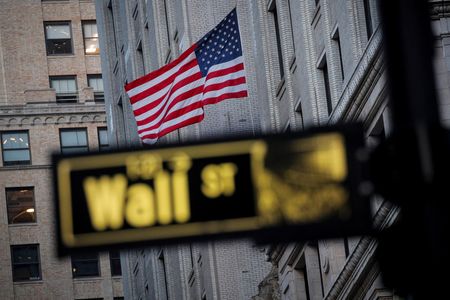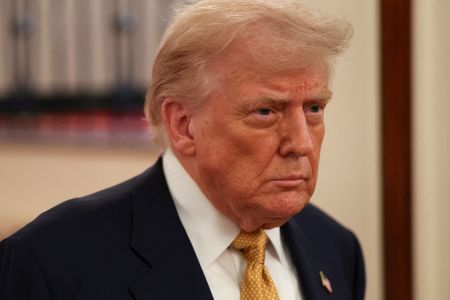By Suzanne McGee, Niket Nishant and Manya Saini
NEW YORK (Reuters) -Bitcoin’s surge to a record this week has reignited questions about the role institutional investors are playing in pushing it higher, with analysts suggesting their role is still in its infancy.
The world’s largest cryptocurrency earlier this week surged to a record above $123,000, receiving a boost on the expectation of pro-crypto policies from Washington. While buzz around digital assets has increased, there is room for demand from institutional investors to grow as pension funds and other long-term buyers add bitcoin to their portfolios, analysts say.
On Thursday, the U.S. House of Representatives voted in favor of creating a regulatory framework for the U.S. dollar-pegged cryptocurrency tokens referred to as stablecoins. President Donald Trump is expected to sign that legislation into law on Friday. The House also passed two other key bills related to cryptocurrencies, both of which will now go to the U.S. Senate.
“We’re still in the early innings when it comes to institutional ownership,” said Adrian Fritz, head of research at 21Shares, a digital assets investment firm, adding that retail investors still dominate crypto markets.
Less than 5% of all spot bitcoin Exchange Traded Fund assets are held by long-term investors such as pension funds and endowments, with another 10% to 15% owned by hedge funds or wealth management firms, Fritz calculates.
The latter group of wealth managers, however, often buy these funds on behalf of high-net worth retail clients, and the bulk of ETF ownership remains retail, he said.
There is a correlation between soaring retail purchases of crypto ETFs and crypto-related stocks and a run-up in prices, according to estimates from Vanda, a financial research firm. The data shows retail buyers bought heavily in late 2024 when prices surged after Donald Trump – who has vowed to be a “crypto president” won the U.S. election – as well as during the recent rally.
Crypto buyers have been aided by a series of bills U.S. lawmakers are expected to pass this week, the most consequential of which – known as the Genius Act – will define the rules around stablecoins, a fast-growing area of the crypto market.
The passage of the crypto legislation on Thursday by the Republican-controlled U.S. House of Representatives paves the way for the first U.S. federal law for digital assets.
Some large U.S. lenders, including Bank of America and Citigroup, are also working on launching stablecoins.
Another bill will provide regulatory clarity by formally establishing definitions of digital commodities and spelling out the roles of agencies in overseeing digital assets. This could make it easier for institutions that have long avoided the sector to invest.
Simon Forster, global co-head of digital assets at trading platform operator and data provider TP ICAP, predicts the number of institutions active in crypto will grow by 2026, including pensions and other buy-and-hold firms.
“By definition, they will be the slowest (to enter crypto),” Fritz said.
BITCOIN TREASURY BUYING
Analysts say data, although patchy given how opaque crypto markets remain, points to the growing role of bitcoin treasury companies in boosting demand.
These are listed companies such as Strategy and GameStop, that initially focused on software and videogame retailing respectively but now emphasize owning and making money on bitcoin positions held on their balance sheets in place of cash, gold or ultra-short Treasury securities.
Strategy’s shares have soared in the past year, far outpacing the rise in bitcoin, with many investors seeing the stock as a way to get exposure to crypto while investing in mainstream financial markets.
Juan Leon, research analyst at Bitwise Asset Management, said these companies’ ability to buy bitcoin suggests they represent a bigger source of recent demand than pension, endowment and hedge funds that are major players in stock and bond markets.
Strategy and GameStop did not respond to requests for comment.
Since July last year, public companies worldwide collectively have increased their bitcoin holdings by 120% and now hold just over 859,000, or 4%, of the total 21 million bitcoin that will ever be in existence, said Simon Peters, crypto analyst at investment platform eToro.
Companies are also selling common stock, preferred shares and convertible securities to raise funds to spend on boosting their bitcoin holdings, in a bid to replicate Strategy’s outsized stock gains.
The new wave of U.S. legislation could also pave the way for more listed companies to allocate a portion of their cash reserves to crypto tokens, said Susannah Streeter, head of money and markets at Hargreaves Lansdown.
Analysts warn, however, that a drop below $90,000 for bitcoin could put half of these corporate treasuries underwater.
Demand for crypto ETFs has also been rising in recent months.
Global net inflows into crypto exchange-traded products hit $4 billion last week, the highest so far this year, according to data from crypto firm Bitwise.
Among the big institutional investors to have made public their investments in crypto ETFs in the past 18 months are the State of Wisconsin Investment Board, Abu Dhabi’s Mubadala sovereign wealth fund and hedge fund Millennium Management, regulatory filings show.
So far this year, bitcoin has gained around 25%, compared with the S&P 500 index’s 6.5% gain. Ether, another cryptocurrency has climbed 2%, while XRP is up nearly 40%.
The crypto sector’s market capitalization now stands at $3.8 trillion, up nearly 66% since before the U.S. election in November, according to CoinMarketCap.
(Reporting by Suzanne McGee in New York and Niket Nishant and Manya Saini in Bengaluru; Editing by Tommy Reggiori Wilkes, Megan Davies and Deepa Babington)










